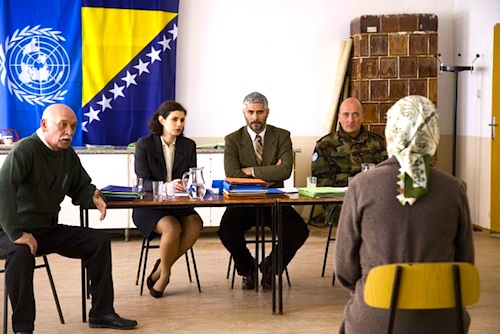By Joe Bendel. Supposedly, Tito held Yugoslavia together as one big happy family. Nonetheless, a late 1970’s episode of ethnic-religious strife eventually causes unimaginable anguish for a Bosnian mother decades later. Her story, inspired by, but not directly based on a documented historical incident, vividly illustrates the painful legacy of war in Arsen Ostojić’s Halima’s Path, which screened last night as part of the narrative feature competition at the 2013 Bosnian-Herzegovinian Film Festival in New York.
Having lost her husband Salko and son Mirza during the war, Halima has been unable to complete the grieving process while their remains are still unaccounted for. However, a breakthrough appears to have been made. Her husband has been recovered. Perhaps her son will be, too. The international team just needs her DNA to match to her son, but she seems strangely reluctant to comply.
Flashing back to 1977, Safija is also in a very difficult position. She lives in a Muslim village and is pregnant with the child of Slavomir, a Christian boy from the nearest Serb village. Her father does not take the news well, beating her severely. After Slavomir violently intervenes, he is quickly dispatched to Germany, for fear of reprisals. He will return, though. Indeed, everyone’s lives will become knotted together in Halima’s bitter tale.
Given the wartime issues Path addresses, it is important to note that Ostojić is in fact a Croatian filmmaker, working with a Bosnian screenwriter, Fedja Isovic, and a Serbian co-producer. While most of the cast is either Croatian or Serbian, nearly all had family ties to Bosnia-Herzegovina (including Srpska, where the film has yet to screen, for obvious reasons). Yes, Isovic’s screenplay unambiguously depicts Bosnian-Serb war crimes. Yet ironically, during the first act, it is Serbian characters, most notably Slavomir’s father, who exemplify tolerance. Of course, war changes people and countries, as viewers see in dramatic terms.

It would be a mistake to dismiss Path as just another film about the war and its aftermath. While it is intimate in its focus, the substantial portion set in 1977 gives it a much wider historical scope. Nor does it rely on stock characters or simplistic moralizing. At its moments of reckoning, Path is most closely akin to classical tragedy in the Sophoclean tradition.
Perhaps more to the point, it also happens to be an excellent film, anchored by the devastating power of Alma Prica’s honest and dignified lead performance. It is remarkable, award caliber work. Sarajevo native Miraj Grbić (recognizable to some as Bogdan in Mission Impossible: Ghost Protocol) also gives a finely nuanced performance as Halima’s brother-in-law, a character who suggests it is possible to become more humane with age, even after suffering the loss of loved ones.
Ostojić is best known for the black-and-white neo-noir A Wonderful Night in Split (co-starring Coolio), but with Path he drastically cranks down the auterist impulse, subordinating style to character and narrative. As a result, Path is visually lean and spare, communicating directly to receptive viewers. More commercial than film scouts have heretofore recognized, Halima’s Path has picked up numerous audience awards thus far. Strongly recommended, it was one of the clear highlights of this year’s Bosnian-Herzegovinian Film Festival in New York.
LFM GRADE: A
[Editor’s Note: Halima’s Path won the Golden Apple Audience Award at the festival.]
Posted on May 13th, 2013 at 11:32am.
